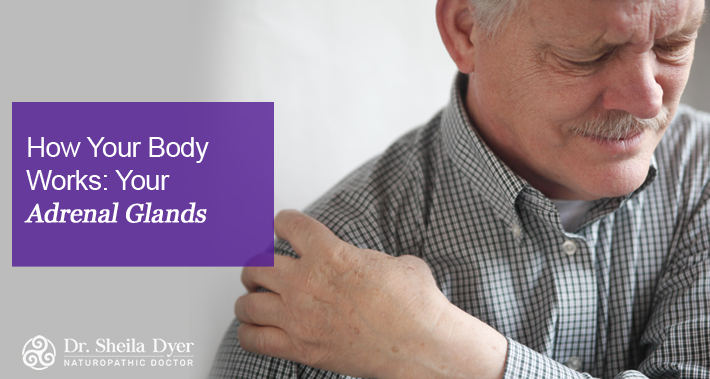Your endocrine system is a network of organs, glands, and hormones in your body.
This system controls just about every function your body might have.
Your endocrine system includes glands like your:
- Hypothalamus
- Pineal gland
- Pituitary gland
- Thyroid and parathyroid glands
- Thymus
- Pancreas
- Ovaries and testes
- And your adrenal gland
Today, we’re going to take a closer look at your adrenal glands.
We’ll talk about what they do, disorders that can affect them, and steps you can take to keep them healthy.
If you are worried about your adrenal gland health, then you can always book a naturopathic assessment.
During this assessment I’ll work to determine if you have developed any issues that are affecting your adrenal glands.
Then I’ll be able to offer you some natural solutions.
Let’s take a closer look at your adrenal glands.
What Are Your Adrenal Glands?
Your adrenal glands are triangle shaped glands that sit just above your kidneys.
They’re an important part of your endocrine system.
Your adrenal glands are composed of two parts, the inner adrenal medulla and the outer adrenal cortex.
Your adrenal glands produce a variety of hormones.
These hormones help control everything from your response to stress to your metabolism to your immune system functioning.
Let’s take a closer look at how exactly this all works.
What Do Your Adrenal Glands Do?
Your adrenal glands produce hormones that are used by your body for a variety of functions.
Your outer adrenal cortex makes steroids like cortisol and aldosterone.
Cortisol helps manage your stress response.
It works along with adrenaline and noradrenaline, which are produced by the inner adrenal medulla.
Cortisol also helps to regulate your blood pressure, glucose levels, and metabolism.
Aldosterone plays a role in moderating blood pressure.
It does this by managing the balance of sodium and potassium in your body.
Your adrenal glands are controlled by your pituitary gland, which tells your adrenal glands how much of each hormone to produce.
Interference with your pituitary gland is one of the potential causes of adrenal gland disorders.
We’ll look at some common adrenal gland disorders in the next section.
Adrenal Gland Disorders
In addition to issues with the pituitary gland, some other reasons you may develop adrenal gland disorders include:
- Genetics
- Infections
- Tumours (benign or cancerous) on the adrenal glands
Let’s have a look at some of the disorders that can affect your adrenal glands.
1. Cushing’s Syndrome
Cushing’s syndrome is a disorder in which your adrenal glands produce too much cortisol.
It’s a progressive disease, meaning it will become worse over time if left untreated.
It can be caused by tumours on your pituitary or adrenal gland which cause your body to produce too much cortisol.
Certain medications can also cause Cushing’s syndrome.
2. Addison’s Disease
Opposite to Cushing’s, Addison’s disease occurs when your adrenal glands don’t produce enough cortisol or aldosterone.
Addison’s is an autoimmune disease.
This means that it causes your immune system to attack your adrenal tissues.
3. Congenital Adrenal Hyperplasia
Congenital adrenal hyperplasia is a genetic condition, which means it’s present from birth.
People with this condition have difficulty with the production of adrenal hormones.
It can also affect the development of sex organs in males.
4. Adrenal Cancer
Adrenal cancer is when malignant (cancerous) tumours develop on the adrenal glands.
It can start in one or both of the adrenal glands.
However, it’s a relatively rare form of cancer.
How Do I Know I Have An Adrenal Gland Issue?
If you have an issue related to your adrenal glands, you may experience some or all of the following symptoms:
- Weight loss or gain unrelated to changes in diet or exercise
- Extreme tiredness
- Perspiration
- Hypotension (low blood pressure)
- Feeling faint or lightheaded
- Vomiting and nausea
- Decreased blood sugar levels
- Cravings for salt
- Muscle pain
- Joint pain
- Dark patches on the skin
- Irregular menstrual cycle
Can You Live Without Your Adrenal Glands?
Your adrenal glands create hormones that are vital for your health.
They can become damaged and non functional due to disease.
In rare cases, they may need to be surgically removed.
If this happens, you can live without them, but not without the hormones they create.
Without adrenal glands, your body can’t produce certain hormones.
If your adrenal glands are removed or damage, you’ll have to take supplemental hormones.
Natural Solutions To Keep Your Adrenal Glands Healthy
You need adequate rest in order for your adrenal glands to repair themselves.
Otherise, you might find yourself feeling under the weather more often than not.
You might experience adrenal fatigue.
This happens when your adrenal glands are not able to make cortisol when it’s required by your body.
With this in mind, let’s look at some natural ways to keep your adrenal glands in good health.
Eat A Healthy Diet
The food you eat has a huge impact on all aspects of your health, including your adrenal health.
Try to incorporate fresh fruits and vegetables, whole grains, and lean meat in your diet as much as possible.
Some nutrient rich foods to consider include:
- Brussel sprouts and broccoli
- Sardines, salmon, and other fatty fish
- Olive oil
- Seeds and nuts
- Avocado
- Free range chicken
-
-
Avoid over processed foods, foods which are hard to digest, and foods containing chemicals and toxins.
There are even ways you can use nutrition to manage your stress.
Let’s take a closer look at stress, too.
Reduce Your Stress Levels
Although most people think stress as a bad thing, it’s not inherently bad.
Sometimes stress can be a good thing.
For example, it can help you be better prepared for that important presentation or job interview.
However, if you experience chronic levels of stress, it can cause you to produce excess cortisol.
This can strain your adrenal glands.
Some ways to control your stress levels include:
- Maintaining a physically active lifestyle
- Mindfulness meditation or yoga
- Avoiding overwork and burnout
- Getting enough sleep
Get Enough Sleep
The most important factor for the health of your adrenal glands is sleep.
Getting between seven and nine hours of sleep every night ensures you are giving your adrenal glands enough time to rest and restore.
Additionally, try to hit the pillow around ten or eleven pm at the latest.
This is a good time to go to bed because your body usually has a surge of cortisol around midnight.
If you’re still awake, this can impact your ability to fall asleep.
If you often have difficulty sleeping, consider trying melatonin to help the process of falling asleep.
Consider Supplements
Some of the vitamins and minerals which are critical for adrenal health include:
- Magnesium
- Zinc
- Vitamin C
- Vitamin D
- B vitamins – specifically B5, B6, and B12
Book Your Appointment With Dr. Sheila Dyer, ND, Today
Are you feeling tired and can’t pinpoint why?
Have you gained or lost weight without an explanation related to changes in your diet or exercise habits?
Are you suddenly craving salty snacks?
Or feeling dizzy and lightheaded?
You might be having an issue related to your adrenal glands.
I’m Dr. Sheila Dyer, a naturopathic doctor in Toronto, and I am here to help.
I can perform a naturopathic assessment to help determine the root cause of any issues you’re experiencing, and create a personalized plan designed to provide treatment for any issues you’re experiencing.
Book a consultation with me today, and take the first step to feeling healthy again.
If you have questions about naturopathic medicine, or would like to start with your first consultation, contact me, and let’s book an appointment.
Dr. Sheila Dyer, ND1080 Dovercourt Rd,
Toronto, ON M6H 2X8
(416) 554-5135
► https://g.page/DrSheilaDyerNd
Dr. Sheila Dyer is a Naturopathic Doctor and a practicing registered nurse offering holistic healthcare with a scientific focus

